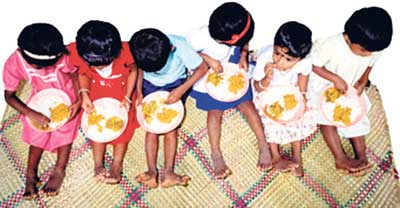
Global food crisis not far away
While the Central Bank tells us the economy is on a steady growth path, cost of utilities have pushed the inflation to very high levels with fixed income earners and those below the poverty line taking the bulk of the beating. Despite this dangerous scenario and escalating defence expenditure the government and the opposition seem to be fully engaged in a tussle for power adding confusion to the political system as well as governance. In fact the much talked of cross over dramas that has now become hot topics in most social gatherings could even put Hitchkock in the shade. The country and its people are sick and tired of elections and politicization, that only benefits the politicians. Such is the unfortunate state of affairs of a country that’s fighting a conflict for well over half a century, despite major upheavals in the global food and energy supplies as well as costs. According to the FAO record world prices for most staple foods have led to high food price inflation in China, Indonesia, Pakistan, Latin America, Russia and India, FAO also adds that wheat has doubled in price, maize is nearly 50% higher than a year ago and rice is 20% more expensive. The worst is global food reserves are at their lowest in 25 years and prices are expected to be higher for years. On the other hand food riots have been reported from India,Yemen and Mexico. The drought in Australia, limitations for cattle feed in New Zealand have seen the global milk prices doubling over the past two years. FAO further adds that the vicious combination of an increase in oil prices and the increase in food prices could lead to a very serious crisis in the future. Another compounding factor seems to be that US farmers are switching over to biofuel crops from cereals and not forgetting the ever increasing demand from China. Any form of natural disasters that are not uncommon in the South Asian Region could worsen the situation. In the post independence history in 1970 amidst soaring global food prices, the then Premier Dudley Senanayake led many initiatives to boost agricultural production and mobilized a land army by enlisting the youth, while a major “Grow more food” campaign was launched through the schools. Then in 1973 in the aftermath of the OPEC formation Sri Lanka faced another food crisis and then Prime Minister Sirimavo Bandaranaike at that time took a number of serious steps to assist the poor. Whatever the criticisms these actions brought desired results. Today we are in the midst of a energy crisis and due to improper planning in the last several decades we have become heavily dependent on imported oil to generate power adding to costs while creating major fiscal imbalances. This crisis was well known but due to shortsightedness as well as incompetent thinking of the rulers high energy costs will last for many more years. If we do not react to the global situations the food crisis too could reach unmanageable proportions at a tremendous burden to the people. Sri Lanka is predominantly an agricultural economy, with agriculture being the livelihood of many in the rural areas. For the past several years paddy crops have been increasing even though the benefits have not reached the consumers due to many logistical bottlenecks. Distribution and marketing of vegetables and fruits continue in age old fashion with little benefit to the consumers though economic centres have made some contribution. The conflict environment has resulted in the fishing industry operating well below expectation. Somewhat stable conditions in the Eastern province known as the “Bread Basket” in Sri Lanka should further boost the paddy production. Given the land fertility and fair climatic conditions, maximum priority should be given to the agricultural sector to obtain the best crop and high productivity. The government should work in partnership with the private sector and could also easily tap the expertise and other resources of companies like CIC, Cargills and the numerous plantation companies who possess many resources in the field of agriculture. |
|
||
| || Front
Page | News
| Editorial
| Columns
| Sports
| Plus
| Financial
Times | International
| Mirror
| TV
Times | Funday Times || |
| |
Reproduction of articles permitted when used without any alterations to contents and the source. |
© Copyright
2007 | Wijeya
Newspapers Ltd.Colombo. Sri Lanka. All Rights Reserved. |
